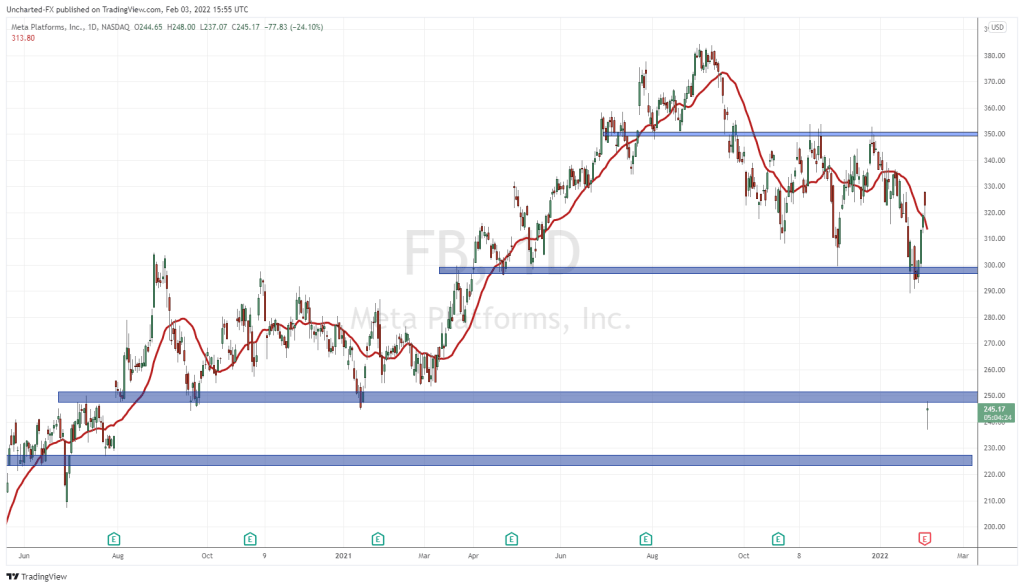Today we’re talking about Meta (FB.Q), and specifically it’s proposed metaverse addition, and why it’s a dumpster fire.
Let’s begin by saying that the price tag on participation in advanced capitalism is your privacy but it shouldn’t have to be this way.

Mark Zuckerberg can’t be trusted with our data
For most of us, the subject header is a reminder. Mark Zuckerberg doesn’t care about your privacy. The Cambridge Analytica scandal came down with almost no recourse or recrimination. The £500,000 (about USD$643,000) fine Facebook paid to the U.K.’s Information Commissioner’s Office, and the $5 billion they paid to the Federal Trade Commission, for its role in the Cambridge Analytica scandal was an insult and a figurative wrist-slap.
Zuckerberg probably paid that out of his personal bank account, or maybe his couch cushions.
It’s also few incentives towards doing it again, especially when the payoff is so much more. Instead of changing their ways and rethinking their value-set, they (and other companies like them) have only revamped and fine-tuned their data collection antics, and the metaverse is going to make that so much worse.
Let’s also not forget that Meta has proven to be a terrible steward of the data they do collect, as in April of last year when data from half a billion Facebook users found its way online, including personal information like phone numbers and email addresses, which could theoretically be scooped up by hackers and scammers.

Meta’s already gobbling up large amounts of data through their virtual reality products. This data includes physical features like hand size, digital objects and audio they create in virtual reality settings, as well as information from third-party developers about their users.
Their smart sunglasses they made along with Ray-Ban capture people candidly on the street without informing people they’re being recorded, and the little white light on the rim of the glasses isn’t easy to see. Zuckerberg doesn’t care.
As long as Meta meetings their earnings milestones next quarter.
But there’s one point that’s worth mentioning.
As the Metaverse Expands, So Will Privacy Laws
One of the largest concerns with virtual reality is that we still haven’t answered many of the privacy problems we encounter in normal reality.
We can’t keep up with technology’s expansion rate and we’re running into a lot of problems at speed, and rather than take the time to find measured and rational decisions, we’re forced by the rate of change to provide slapdash responses that ultimately cause more problems.
One aspect of the metaverse that’s gone under the radar is the sheer amount of personal data that will soon be collected on participants. This goes beyond anything we’ve dealt with before. Now companies will have access to a far more intimate dataset, including physiological responses and deeper, more ingrained biometric data than ever before, like facial expressions, vocal inflections and vital signs in real time.
This wealth of knowledge allows for companies to gain a much more intricate and nuanced understanding of its participant’s behaviour. If we’re talking about companies, this leads to an enhancement in target advertising, but if we’re talking about government data (and government acquisition of data is a subpoena away, if not given away for free) then it could be vastly worse.
Remember the Rohingya? These were the sect of muslims in Myanmar which saw dire consequences due to Facebook’s negligence, allowing the network’s algorithms to fan the flames of hate speech, which led to violence. It’s one of the unforeseen consequences of social media vol. 1.0, and now that we’re staring down the metaverse with its advanced algorithms and data collection AI, we have to wonder what invisible harms may be coming our way.
In Canada
We’re starting to pay attention finally.
In recent years companies using artificial intelligence technologies have drawn the attention of Canada’s privacy commissioners because of all the unlawful mass surveillance and collection of biometric data. At present, though, Quebec is the only province in the nation that’s done anything about it by regulating biometric data collection.
But on the federal level we have the Personal Information Protection and Electronic Documents Act (PIPEDA), which governs the use, collection and disclosure of personal data of social media users. It pushes organizations to get informed consent from individuals before collecting, using or disclosing information.
The curious bit is that it doesn’t differentiate between adults and youth and recommends to limit or avoid data collection on children. Given the strong probability that the metaverse is going to be available to (and likely dominated by) children, we’ll need more guidance from privacy regulators to make sure informed consent becomes a mainstay here. 
And companies like Meta are held accountable when they breach it.
But there are more ways than just this as to how the metaverse could work as a cash cow for Big Data.
Remember that everything you do in the metaverse ultimately goes on a blockchain and what goes on a blockchain stays on a blockchain forever. In a few years of data collection from millions of users, that blockchain would represent a treasure trove of raw data for anyone from governments, both malignant and benign, to companies in search of analytics for commercial exploitation.
If you factor in that the Chinese government built their artificial intelligence algorithms based on years of data collected from their social media platform, WeChat, with its various limitations—imagine what a properly motivated government could accomplish with the same social media analytic data compounded with biometrics gleaned from the metaverse.
There would be nowhere to hide.
Meta’s Numbers:
Let’s switch gears and go into a bit of the financial side of Meta’s proposed project. Right now, Meta is probably the best known metaverse company presently in operation. There are plenty of others, naturally, but they’re in niche markets and by niche I mean crypto.
While Meta still uses all of the typical tech of the trade, namely artificial intelligence, blockchain and blockchain ancillaries like non-fungible tokens (NFT), they’re usually not spoken of in the same categories as Decentraland or The Sandbox.
Zuckerberg’s gone on record talking about mining your avatar’s clothing using NFTs, and beyond that, using NFT as part of the digital world’s governance package. Functionally, minting your own clothing like a skin in a video game isn’t anything profound or new. All of the existing metaverses are doing that—what is noteworthy, though, is that if you were try to monetize it by selling it in the digital marketplace, Zuckerberg would be right there to take a 50% cut of everything you make.
Given that anything you make and sell on the metaverse and then try to monetize yourself is subject to 50% capitals gains tax (at least in Canada), it basically makes it not worth your while if you’re going to try and monetize your time by making functional assets on Meta’s platform. You know who doesn’t do that? Literally every other platform.
Now let’s talk about then numbers:
Meta’s first quarterly 2022 results reported that Reality Labs, which is responsible for the company’s metaverse, lost $2.9 billion in Q1 of 2022. That’s actually more of a loss than their $1.8 billion loss in Q1 2021. In terms of revenue, they made $695 million during Q1, which is up from last year’s Q1 revenues of $534 million.
Those are not good numbers, but this was part of Zuckerberg’s plan, or so he would have you believe.
“We expect 2022 total expenses to be in the range of $87-92 billion, lowered from our prior outlook of $90-95 billion. We expect 2022 expense growth to be driven primarily by the Family of Apps segment, followed by Reality Labs,” Zuckerberg said in his earnings report.
Reality Labs works on virtual and augmented reality products wherein folks can work, play, and socialize. They blew through $10 billion through 2021, and 40% of which went to employee costs, research and development and item costs.
Despite the losses Meta is still bullish on the future of the metaverse.
Buy some MANA or LAND and get involved in a project with real legs. Leave Zuckerberg and his surveillance machine alone.
—Joseph Morton







